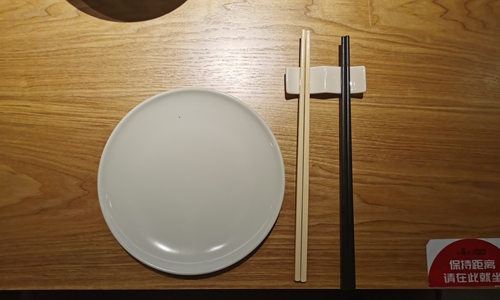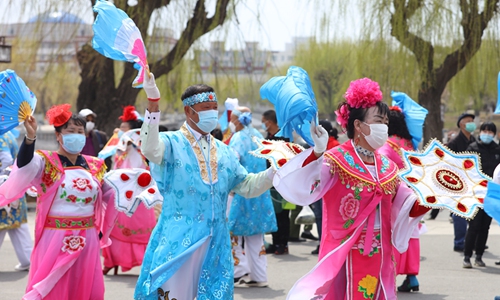
From People’s Daily app.
And this is Story in the Story.
As preventing the novel coronavirus has fostered hygiene-consciousness among the public, some Chinese people may stop eating hotpot in restaurants and abandon their finger-guessing drinking game that has lasted for some 2,000 years.
In addition to social distancing, some hygiene practices to prevent the novel coronavirus have become a part of daily life in China, fostering a wave of new social civilization in the country.
"The pandemic might change people's hygiene habits as it now feels like I am streaking if I forget to wear a face mask," a web user said in his Sina Weibo account, China's Twitter-like social media platform.
"I wash my hands every time before I touch my face, I bring alcohol pads all the time, and clean tableware before eating in a restaurant," said Beijing resident Wang Lele.
"I take a small bottle of alcohol in my bag as I feel uncomfortable touching things without wiping them with alcohol," said another citizen.
Today’s Story in the Story looks at whether COVID-19 will cause permanent changes in Chinese hygiene and dining etiquette.

Two pairs of chopsticks in different colors are provided to customers in a Beijing restaurant, with one pair used as serving chopsticks. (Photo: GT)
The pandemic has made more people adopt a more separated eating habit, even during banquets.
Du Cheng, in charge of a branch of the Jindingxuan restaurant chain in Sanlitun area of downtown Beijing, said that the restaurant has been recommending customers use separate plates since it reopened eat-in service.
"When two or more people eat together, we would recommend them to use separate plates," said Du.
The restaurant also requires customers to disinfect their hands before eating.
"In the beginning, many people would resist as it goes against most Chinese people's dining habits of sharing food," said the manager, adding that later people would initiatively require separating plates.
Each customer would be given two pairs of chopsticks in different colors when they choose not to have separate plates. "Black chopsticks are used to pick up food from the big plates, and the white ones are used to eat with," Du explained.
As a result of separate plates and small dining tables, the loud finger-guessing game most men play when drinking has ceased, said Du.
Xiabu Xiabu, a hotpot restaurant chain in China has seen a lot fewer customers dining in even after Beijing lifted its first level public health response on April 30.
Tong Xueling, a manager of a Xiabu Xiabu located in Guijie, Beijing's famous prosperous snack street, said that before the pandemic, a long queue would be seen in front at dinner time, and now only a few people can be seen in the restaurant as most people choose to order online and eat at home.

People wear face masks and dance in a square of Changchun, capital of Northeast China's Jilin Province. (Photo: IC)
Wu Hao, a member of the National Committee of the Chinese People's Political Consultative Conference and head of the Fangzhuang community health service center in Beijing, proposed that new lifestyles adapted to cope with and contain COVID-19 should be kept even after the pandemic.
"Measures such as social distancing, washing hands frequently, garbage classification, wearing masks during flu season, pre-registering online when visiting hospitals and online diagnosis should all be promoted after the pandemic," he said.
"We should turn these new measures into 'new normal,’ as it's possible that the virus could exist for years and we cannot really eliminate the disease for good," Wu said.
A 50-year-old Beijing resident said he used to smoke a lot, but the pandemic makes him want to quit. "Before, I would occasionally spit on the street, but I’ve stopped doing that as people avoid me like I am infectious which makes me feel ashamed," he said.
A new rule in Beijing stipulates that people should cover their nose and mouth when coughing or sneezing in public, and patients with respiratory diseases such as the flu must wear a face mask and are banned from eating on public transportation.
A survey conducted by the China Youth Daily among 2,006 interviewees in the middle of April showed 66.5 percent of interviewees fostered good hygiene habits during the COVID-19 epidemic.
(Produced by Nancy Yan Xu, Brian Lowe, Lance Crayon and Da Hang. Music by bensound.com. Text from Global Times.)


